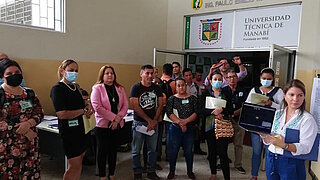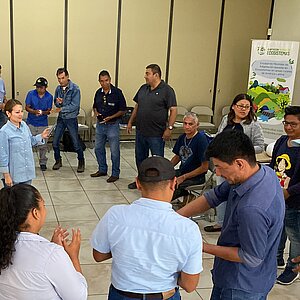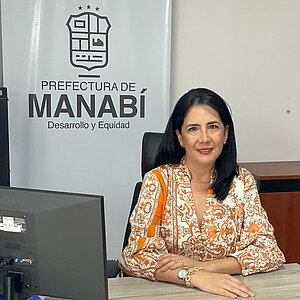The link between gender and climate change

Ecuador is enhancing its capacities by considering gender as an intersectional topic for adaptation to climate change.
To strengthen capacities for promoting the mainstreaming of gender considerations in local adaptation to climate change, the IKI-funded regional programme Scaling Up Ecosystem-based Adaptation Measures in rural Latin America (EbA LAC) organised a workshop on gender and climate change in coordination with the National Plan for Adaptation to Climate Change (PLANACC) and the Ecuadorian Ministry of Environment, Water and Ecological Transition (MAATE).
The PLANACC fosters an enabling environment for adaptation to climate change at sectoral and local levels. It also encourages the generation of knowledge and, above all, capacity building to bolster inter-institutional efforts for ensuring the sustainability of processes focused on adaptation to climate change (ACC) and ecosystem-based adaptation (EbA) as proposed by the EbA LAC programme.
"Education is the key to our progress, to sustaining gender equality and to appropriate actions that allow us to adapt to the impacts of climate change, which affect men and women in different ways. It is also important to raise awareness of these issues in order to generate more opportunities and resources," said Yofre Ramón Mendoza Zambrano, who represents irrigation users in the Manabí Watershed Council.
The workshop was held in Portoviejo Canton at the Technical University of Manabí (UTM). With a skill-based learning methodology inspired by design thinking, work teams discussed the challenges arising in this area and possible solutions with creativity and a multidisciplinary approach.
"I congratulate the EbA LAC programme for bringing this training workshop to Manabí addressing important issues such as gender and climate change, which need to be anchored at the state and national level. To reduce gender inequality here, it is important that families and households assume their important role in generating sustainable social changes, especially in rural areas where socio-cultural aspects have more impact," said Jessica Chavez Pisco, climate action coordinator of the Decentralized Autonomous Government of Manabí.
More than 85 multipliers participated in the workshop
The workshop brought together more than 85 EbA multipliers from various institutions and organisations at the subnational level.
"It is crucial that all education levels, projects and work initiatives critically examine gender inequality as well as the realities and needs of women and men and the impacts suffered by each group, taking account of their roles and the actions they must implement in their territory to adapt to climate change," said Flor María Cárdenas Guillén, research professor at the Higher Technical College for Agriculture and Livestock (ESPAM MFL).
Thanks to the workshop, it was possible to:
- understand and interpret concepts that allow scaling up the gender approach and adaptation to climate change in the participants' jobs;
- contribute to inter-institutional articulation for gender mainstreaming;
- strengthen gender-related knowledge and expertise;
- and promote ACC and EbA for the sustainability of local processes.
The link has been copied to the clipboard
Contact
IKI Office
Zukunft – Umwelt – Gesellschaft (ZUG) gGmbH
Stresemannstraße 69-71
10963 Berlin
Related Videos
Related Publications
-

-
 08/ 2024 | IKI Evaluation
08/ 2024 | IKI EvaluationExecutive Summary for the Mid-Term Evaluation “Scaling-up Ecosystem based Adaptation (EbA) Measures in Rural Latin America”
English (PDF, 322 KB, barrier-free)
German (PDF, 283 KB, barrier-free)
Spanish (PDF, 287 KB, barrier-free)
Follow-up of MTE recommendations by the project consortium (PDF, 162 KB, barrier-free)

















